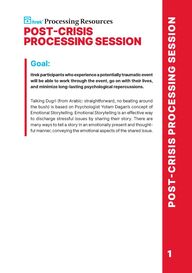
Return to flip book view
POST CRISIS PROCESSING SESSION Processing Resources POST CRISIS PROCESSING SESSION Goal itrek participants who experience a potentially traumatic event will be able to work through the event go on with their lives and minimize long lasting psychological repercussions Talking Dugri from Arabic straightforward no beating around the bush is based on Psychologist Yotam Dagan s concept of Emotional Storytelling Emotional Storytelling is an effective way to discharge stressful issues by sharing their story There are many ways to tell a story in an emotionally present and thoughtful manner conveying the emotional aspects of the shared issue 1 Message
POST CRISIS PROCESSING SESSION Activity course 1 Divide the participants into groups of 10 15 2 Set compassionate listening as the discussion ground rule When someone shares their personal story they need your compassionate listening not advice Rarely can something you say change the dire situation being shared with you What the sharer needs is to feel empathy They need to sense your ability to put yourself in their shoes and to identify with their emotions 3 Explain the five guiding elements of Emotional Storytelling See attached page If possible allow the mediator of every group to do that If there is no mediator for every group explain the five guiding elements of Emotional Storytelling to everyone provide the groups with written guidelines and spend some time with every group 4 While the participants share their stories direct them to the accompanying questions appearing under the Five Guiding Elements 5 The Dugri Echo Phase When you recognize that the other person has finished sharing their story take a moment to reflect on what you have heard Remember no judgment no advice no fixing This is a moment of sanctity of wholeness It is the crux of the session listening with compassion and providing a stable path to walk Thank them for sharing Echo what you have heard by naming the feelings that were shared Sometimes you may feel it necessary to name the emotions you sensed were not verbally expressed Acknowledge that you understand what made the event or issue troubling which emotional buttons were pressed If an opportunity for personal awareness change or growth was revealed state what that opportunity might be in your own words 2
POST CRISIS PROCESSING SESSION The Five Guiding Elements 1 Share the facts Describe in enough detail so that the listeners understand both the content and the context of your story Take your time to think it through to enable the listeners to put themselves in your shoes Where were you when the incident happened Were there other people around you Do you remember any of them Were you with other Israel Trek participants What were you doing when the incident started Were you carrying anything What were you wearing What was the weather like Where were you going Describe step by step what happened What did you see What did you hear How did the people around you respond How did you respond Did the incident end How did it end 3
POST CRISIS PROCESSING SESSION 2 Talk about emotions Share how you feel about the situation and name the emotions and feelings that engulfed you Anger Sadness Despair Anxiety Try to sense what you are feeling now while relaying your story Try not to hide or downplay your emotional reaction Your Dugri ally Leader or Tour Educator will note your emotional state with empathy and recognition Don t hold back the tears if you feel them Sadness like love or joy is just another emotion The following questions can help participants in this intimate phase How did you feel during when you heard about the incident Anger Sadness Despair Anxiety How do you feel now How do you feel about the incident in retrospect Did your emotions surprise you Have you encountered those feelings in the past 4
POST CRISIS PROCESSING SESSION 3 Discover uncover your vulnerability Everyone has vulnerabilities Try to express what troubled you and what triggered your emotions Maybe you cannot understand why you feel the way you do Perhaps you feel that you have let yourself down Internalized frustration is normal Try to be aware of your vulnerabilities People especially those who know you well might press your buttons to move you to action or to upset you Was it a specific issue a person or an action that has affected you Can you point to a specific moment during the incident that has affected you How has this troubled you Did this echo a moment in your past Did it echo a fear sen sitivity you carry 5
POST CRISIS PROCESSING SESSION 4 Coping Stressful situations occur daily and elicit a variety of coping responses Each of us uses coping mechanisms that have served us well and those may vary from one person to another Most times we are not aware of our coping reactions We just do it Positive psychology is used as a frame of reference when focusing on strengths being proactive and awareness led coping Ask yourself How am I handling the current situation What helps me cope What helps me deal with this past or ongoing stressor 5 Find the hidden opportunity While getting the facts out and naming the accompanying emotions you may be able to identify the buttons that were pressed that threw you off balance As the facts feelings and coping mechanisms weave into your story zoom out to view the full picture Remember in every crisis there is an opportunity What can you learn about yourself How can this knowledge or awareness help you become a better person friend or partner 6